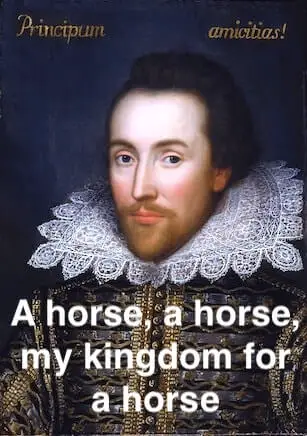‘A horse, a horse, my kingdom for a horse’ is from
Shakespeare’s Richard III, 1594.
The expression is one of the best-known in all drama. It is notable for two reasons.
Firstly, ‘a horse, a horse, my kingdom for a horse’ is a good example of iambic pentameter. Shakespeare used iambic pentameter frequently and this is often quoted as a classic example.
An iamb is a poetic form which is made up of two syllables, the first unstressed and the second stressed. This sounds like ‘da Dum‘.
Any line in a poem using iambs is iambic and one using five of them is an iambic pentameter. So, iambic pentameters have the pattern of:
‘da Dum, da Dum, da Dum, da Dum, da Dum,
Shakespeare’s line naturally falls when spoken as ‘a Horse, a Horse, my Kingdom For a Horse.
The second reason that this line is important relates to the attempts by some modern historians (known as Ricardians) to restore the reputation of Richard III. The Richard III Society exists primarily for that reason. They claim that Shakespeare’s depiction of Richard as a villainous cripple who murdered ‘the princes in the tower’, his nephews Edward V and Richard, Duke of York, is inaccurate.
Ricardians view Shakespeare’s portrait of Richard III as a character assassination prompted by a conspiracy organised by Richard’s enemies, notably Henry VII, who took the English throne after defeating and killing Richard III at the Battle of Bosworth in 1485.
There appears to be some validity in the claims of the Richard III Society as Richard’s reign was a rather enlightened one, despite lasting only two years. However, when Richard’s body was discovered under a car park in Leicester in 2012, it was found that he had had a spinal deformity. So, at least part of Shakespeare’s portrait wasn’t entirely wrong. Also, Richard was appointed to the post of Lord Protector, who was supposed to look after his young nephews and arrange Edward V’s coronation. The subsequent disappearance of the children from the Tower of London and Richard’s coronation as king is strong circumstantial evidence against Richard, which remains unexplained. Whatever the Ricardians say, Richard had motive, means and opportunity in shedloads – good enough for an arrest in modern criminology.
Coming back to ‘a horse, a horse, my kingdom for a horse’. This line plays a part in the relentless campaign by Ricardians to show Shakespeare’s play to be misleading. They say that Shakespeare was portraying Richard as a coward in being prepared to offer everything in order to desert his troops and ride away to escape death in battle. In fact, Shakespeare actually describes Richard, having lost his horse, as fighting valiantly on foot to win the day. His desire for a horse was to continue the fight, not to escape.
In real life, the recent examination of Richard’s skeleton, rediscovered after 527 years, show that he died of head wounds. It is likely that these were sustained while he was on foot, not on horseback. He was the last English king to die in battle.
Whatever the truth about Richard, 500 years later we are reliant on guesswork. No one knows what happened to the princes in the tower and the few verifiable accounts of the Battle of Bosworth lack detail.
Shakespeare’s play is of course a work of fiction, not a historical essay. Any dramatist seeks out a drama, and what’s a good drama without a villain? He was writing a hundred years after Richard’s death and was reflecting, and probably exaggerating for dramatic effect, the poor opinion of Richard that was widespread in 16th century England. Then, as now, Richard was widely believed to have had a hand in the murder of the princes.
‘A horse, a horse, my kingdom for a horse’ was a famous enough line, even in Shakespeare’s lifetime, to attract spoof variants. In 1605 his contemporaries John Marston, Ben Jonson and George Chapman and wrote a satirical play called Eastward Hoe, which contains the line:
A boat, a boat, a boat, a full hundred marks for a boat!
Marston later repeated the trick in the poem The Scourge of Villainie:
A Man, a man, a kingdome for a man.
Note the lack of iambic flow in the Eastward Hoe variant. Shakespeare is generally acknowledged to be the greatest writer ever to have written in English whereas Marston, not to put too fine a point on it, isn’t.
This line, in context in the play, is:
CATESBY:
Rescue, my Lord of Norfolk,
rescue, rescue!
The king enacts more wonders than a man,
Daring an opposite
to every danger:
His horse is slain, and all on foot he fights,
Seeking
for Richmond in the throat of death.
Rescue, fair lord, or else the day is
lost!
KING RICHARD III:
A horse! a horse! my kingdom for a horse!
CATESBY:
Withdraw, my lord; I’ll help you to a horse.
KING RICHARD III:
Slave, I have set my life upon a cast,
And I will stand the hazard of the die: 10
I think there be six Richmonds in the field;
Five have I slain to-day, instead of him.
A horse! a horse! my kingdom for a horse!

